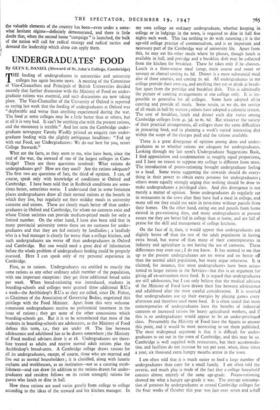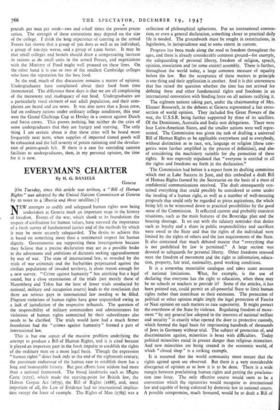UNDERGRADUATES' FOOD
By GLYN E. DANIEL (Steward of St. John's College, Cambridge)
THE feeding of undergraduates in universities and university colleges has again become news. A meeting of the Committee of Vice-Chancellors and Principals of British Universities decided recently that further discussion with the Ministry of Food on under- graduate rations was essential, and such discussions are now taking place. The Vice-Chancellor of the University of Oxford is reported as saying last week that the feeding of undergraduates at Oxford was " deplorable and worse than anything experienced during the war. The food. at some colleges may be a little better than at others, but at all it is very bad. It can't be anything else with the present rations, and the monotony is terrible." And last term the Cambridge under- graduate newspaper Varsity Weekly printed an enquiry into under- graduate feeding with the slightly ambiguous headlines: "Fed up with our Food, say Undergraduates: We do our best for you, retort College Stewards."
What are the facts, as they seem to me, who have been, since the end of the war, the steward of one of the largest colleges in Cam- bridge? There are three questions involved: What rations do undergraduates get? How are they used? Are the rations adequate? The first two are questions of fact, the third of opinion. I can, of course, speak only with knowledge of conditions at Oxford and Cambridge. I have been told that in Redbrick conditions are some- times better, sometimes worse. I understand that in some fortunate places undergraduates draw all their normal rations at the hostels in which they live, but regularly eat their midday meals in university canteens and unions. These are clearly much better off than under- graduates in Oxford and Cambridge, for whom no canteens exist and whose Union societies can provide medium-priced meals for only a limited number. On the other hand, I have also been told that in many provincial university towns there are no canteens for under- graduates and that they are fed entirely by landladies ; a landlady who is a bad manager is clearly far worse than a college kitchen, and such undergraduates are worse off than undergraduates in Oxford and Cambridge. But one would need a great deal of information before the whole problem of undergraduate feeding could be properly assessed. Here I can speak only of my personal experience in Cambridge.
First, as to rations. Undergraduates are entitled to exactly the same rations as any other ordinary adult member of the population, with one important exception: they get three additional bread units per week. When bread-rationing was introduced, students in boarding-schools and colleges were granted three additional B.U.s a week—the Archbishop's B.U.s as they are called, since Dr. Fisher, as Chairman of the Association of Governing Bodies, negotiated this privilege with the Food Minister. Apart from this very welcome concession undergraduates receive no preferential treatment in the issue of rations ; they get none of the other concessions which boarding-schools get. But it is to be remembered that most of the students in boarding-schools are adolescents, as the Ministry of Food defines this term, i.e., they are under 18. The line between adolescence and adulthood has to be drawn somewhere ; the Ministry of Food medical advisers draw it at r8. Undergraduates are there- fore treated as adults and receive normal adult rations plus the Archbishop's bread-units. A Cambridge college draws rations for all its undergraduates, except, of course, those who are married and live out as normal householders ; it is classified, along with lunatic asylums and workhouses, as an institution—not as a catering estab- lishment—and can draw (in addition to the rations drawn for under- graduates and resident fellows on its ration strength) rations for guests who lunch or dine in hall.
How these rations are used varies greatly from college to college according to the ideas of the steward and his kitchen manager. In
my own college an ordinary undergraduate, whether keeping in college or in lodgings in the town, is required to dine in hall five nights each week. This has nothing to do with rationing ; it is the age-old college practice of commensalism, and is an important and necessary part of the Cambridge way of university life. Apart from this, he may eat his other meals where he pleases, though lunch is available in hall, and porridge and a-breakfast dish may be collected from the kitchen for breakfast. These he takes only if he chooses. Lunch is a three-course meal (soup, main course and sweet or savoury or cheese) costing rs. 6d. Dinner is a more substantial meal also of three courses, and costing 2s. 9d. All undergraduates in my college provide their own tea, and anything they eat or drink at break- fast apart from the porridge and breakfast dish. This is admittedly the picture of catering arrangements at one college only. It is im- possible to generalise for all colleges. Some have adopted all-in catering and provide all meals. Some retain, as we do, the service of all meals in hall by waiters ; others have adopted a cafeteria system. The cost of breakfast, lunch and dinner each day varies among Cambridge colleges from 4s. 3d. to 6s. 6d. But whatever the variety of their practical arrangements, all colleves share the same difficulties in procuring food, and in planning a week's varied interesting diet within the scope of the charges paid and the rations available.
There is a great divergence of opinion among dons and under- graduates as to whether rations are adequate for undergraduates. Looking through my last term's Undergraduate Suggestions Book, I find appreciation and condemnation in roughly equal proportions, and I have no reason to suppose my college is different from most. The introduction of potato-rationing brought undergraduate feeling to a head. Some wrote suggesting the stewards should do every- thing in their power to obtain extra potatoes for undergraduates ; others wrote equally strongly urging that nothing should be done to make undergraduates a privileged class. And this divergence is not merely a matter of opinion. Some undergraduates do regularly eat in restaurants in the town after they have had a meal in college, and many tell me they could not exist in term-time without parcels from their homes. On the other hand, eating out and parcels from home existed in pre-rationing days, and many undergraduates at present assure me they are better fed in college than at home, and are full of praise for the skill and management of college kitchens.
On the face of it, then, it would appear that undergraduates are slightly better off than the rest of the adult population in having extra bread, but worse off than many of their contemporaries in industry and agriculture in not having the use of canteens. These differences may even out ; I do not know. It has seemed to me that up to the present undergraduates are no worse and no better off than the normal adult population, but many argue otherwise. It is claimed, for instance, that most undergraduates have been accus- tomed to larger rations in the Services—but this is an argument for giving all ex-servicemen more food. It is argued that undergraduates are still adolescents, but I can only believe that the medical advisers of the Minister of Food have drawn their line between adolescence and adulthood after the most careful consideration. It is asserted that undergraduates use up their energies by playing games every afternoon and therefore need more food. It is often stated that most contemporaries of undergraduates have the benefits of industrial canteens or increased rations for heavy agricultural workers, and if this is so undergraduates would appear to be an under-privileged class. Presumably the Ministry of Food have the figures to answer this point, and it would be most interesting to see them published. The most widespread argument is that it is difficult for under- graduates to eat out in the town of Cambridge, and this may be so. Cambridge is well supplied with restaurants, but their accommoda- tion and facilities do not increase by ten per cent. when, three times a year, six thousand extra hungry mouths arrive in the town.
I am often told that it is much easier to feed a large number of undergraduates than cater for a small family. I am often told the reverse, and much play is made of the fact that a college household consists almost entirely of the same age-grade. Potato-rationing showed me what a hungry age-grade it was. The average consump- tion of potatoes by undergraduates at several Cambridge colleges for the four weeks of October this year was just over seven and a-half pounds per man per week—two and a-half times the present potato ration. The strength of these contentions may depend on the size of the college. I think the long experience of catering in the armed Forces has shown that a group of 50o does as well as an individual, a group of too-25o worse, and a group of r,000 better. It may be that small colleges and hostels should draw a compensating increase in rations as do small units in the armed Forces, and negotiations with the Ministry of Food might well proceed on these lines. On the other hand it is one or two of the smallest Cambridge colleges who have the reputation for the best food.
In the end, much of this discussion remains a matter of opinion. Undergraduates have complained about their food from time immemorial. The difference these days is that we are all complaining of the monotony and inadequacy of our food. Undergraduates are a particularly vocal element of our adult population, and their corn- plaints are heard and are news. It was also news that a Jesus crew, fed on ordinary rations under ordinary college conditions, this year won the Grand Challenge Cup at Henley in a contest against Dutch and Swiss crews. This proves nothing, but neither do the cries of some undergraduates that they are hungry and starving. The only thing I am certain about is that these cries will be heard more frequently next term, when supplies of imported tinned goods will be exhausted and the full severity of potato rationing and the devalua- tion of points-goods felt. If there is a case for extending canteen facilities to undergraduates, then, in my personal opinion, the time for it is now.



































 Previous page
Previous page